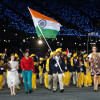Water, water everywhere, but…
Our real problem is population, I told an American Nobel Prize winner. He contradicted me and said: "Your problem is going to be water." We were discussing the ordeals that India would face in the years to come. Our views did not tally even after a long discussion.
What has happened at Latur, in a better-off state like Maharashtra, has renewed the American's warning. Section 144 had to be clamped down to ensure that pots and pans were in an orderly queue to receive water from a tanker; this took me back to the said warning.
The American had also given me an optimistic side: There is an ocean of water under the Yamuna-Gangetic plan waiting to be tapped. I wonder if this is true. Had it been so, the government would have done a scientific study by this time to get an estimate of the collected water. I have not heard of any such plan so far.
Maharashtra may be the worst hit state this year. There were some other states last year. The economy of most states, in fact, for that matter, the country, is very dependent on the monsoon. It looks like we need to continue scanning the sky for the dark clouds.
The Bhakra Dam in Punjab and Himachal Pradesh has converted the entire area, including Haryana, into India's granary. India's first Prime Minister Jawaharlal Nehru hailed the Bhakra Dam as a "temple". He said at that time that India's traditional 'temples', meaning the dams and industrial projects, would be there but new 'temples' have to be built for our economic development.
This Bhakra Dam alone can feed the entire population of the country. However, it is not necessary to build big dams which create problems of rehabilitating uprooted people from their hearth and homes. Small, satellite dams can probably serve the same purpose well, if not better.
This was the genesis of the agitation led by social activist Medha Patkar over the height of the dam on River Narmada. She could not succeed, even though the government-sponsored report by Saifuddin Soz, then Water Resources Minister, said that the gain from the dam would be far less than the loss from the ousting of people who had been living in the area for many years.
However, the dam was built several years later when Gujarat gave an undertaking that it would give land to compensate farmers and others who were uprooted. It is another matter that the state government could not fulfil its promise because there was not enough land to go around.
India has seven major rivers - the Ganges, Brahmaputra, Indus, Narmadha, Krishna, Godavari and Kaveri - and numerous tributaries. New Delhi has set up the Central Water and Power Commission to have a systematic plan to harness not only water but also generate power. This has worked to a large extent, but in certain parts of India, the fallout has led to a series of disputes, which remain unsolved even after decades.
This situation has also led to estrangement between people of different states. For example, the sharing of Kaveri water between Karnataka and Tamil Nadu has been hanging fire for several years now. This is despite the Supreme Court's verdict to release certain cusecs of water to Tamil Nadu.
Nearer home, Punjab has refused to release water to Rajasthan. This is contrary to the stand New Delhi had taken during the Indus Water Treaty. At that time, to claim more water from the Indus, India argued before the World Bank, which was funding the project, that it required a large quantity of water to irrigate the sandy area of Rajasthan.
It's ironic that Punjab has now refused to release water to Rajasthan which got a favourable verdict from New Delhi. The World Bank then accepted the argument that India could not give Pakistan water because it needed to retrieve the land from sand dunes in Rajasthan. What explanation do we have when Punjab goes back on its undertaking to give water to Rajasthan?
It is conceded that water reaching Rajasthan would help grow numerous crops, but some land in Punjab and Haryana, already under irrigation, would have to be denied water. Such incongruities are responsible for inter-state water disputes. Even after 70 years of independence, the disputes are far from settled.
When the Congress ruled both at the Centre and in the states, the problems never assumed an ugly shape. The Bhartiya Janata Party (BJP), which then only commanded a few Lok Sabha members, did not count much. It is a different scenario today. Now that it has a majority in Parliament, the BJP sees to it that the states run by it get the maximum benefit, rules or no rules.
Prime Minister Narendra Modi did declare, from the rampart of the Red Fort soon after taking over, that India was one and there would be no discrimination against states on the basis of their affiliation to different parties. But this is not true on the ground. The Congress, which is now in the opposition, does not allow even Parliament to function.
The Rajya Sabha stayed adjourned for several sessions till the party itself realised that differences would be better highlighted if there was a discussion in the house. At present, it seems that all political parties have come to an understanding that Parliament should be allowed to function. One hopes that all parties will stick to the consensus they have reached and discuss the matters in earnest as it used to happen before.
If that spirit is translated into action, there would be no disturbance in Parliament and the elected representatives, who have exasperated the public by their boisterous behaviour, will be able to devote their attention to what ails the country. Then no dispute, be it over water or any other issue, will stall a session.
The writer is an eminent Indian columnist.

 For all latest news, follow The Daily Star's Google News channel.
For all latest news, follow The Daily Star's Google News channel. 








Comments